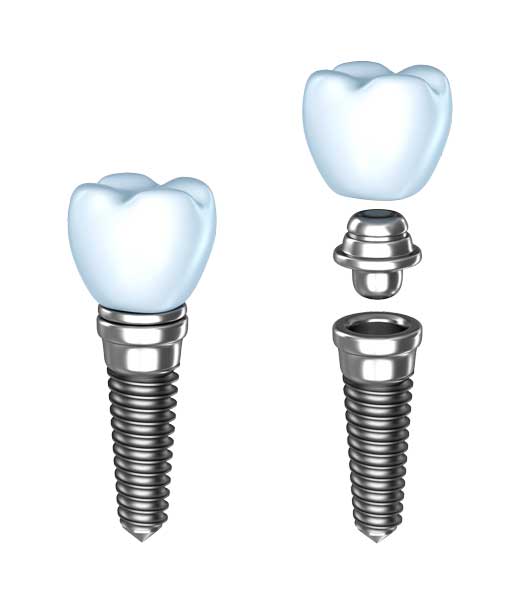Can you imagine yourself smiling with a missing tooth? Scary right?
Missing teeth can be an embarrassing affair that can refrain you from smiling or speaking freely in public.
What if you could get your missing teeth back? Though it’s not possible to fix the natural teeth back again in their original position, you can opt for dental implants to fill in space with artificial teeth that look just like your natural teeth.
Dental implants are artificial teeth roots that have a screw-like shape. When placed in your jawbone, implants bond with your natural bone to form a sturdy base for new artificial teeth. You can replace one or more missing teeth with the help of dental implants and get back your beautiful smile and the confidence that goes with it.
What are the types of dental implants?
Dental implants are considered to be a successful option for treating tooth loss as they can replace both the root as well as the crown. There are mainly two types of dental implants that the dentist may recommend:
Endosteal
The most common type of dental implant for replacing one or multiple missing teeth is endosteal. You can expect the dentist to place a post directly into the jawbone surgically. This implant is ideal for supporting bridges and removable dentures.
Subperiosteal
A subperiosteal implant is placed onto the jawbone and not into it. To hold the dental prosthetic in place, the posts are protruded through the gum tissue. This implant type is ideal for covering a large surface area, where there is not enough bone to support endosteal implants.
Dental implants offer an effective way of fixing artificial teeth. The procedure usually involves two steps. Some advanced implants may be fixed in and completed in just one step.
Step 1
The first step involves cutting your gums to expose the bone. Then a hole is drilled in the bone to place the implant. Once the implant is put into place, the dental surgeon may suggest getting an X-ray done of that particular area to see if the implant has been placed in the right position. Next, the gum will be stitched to cover the bone. You can expect the stitches to be removed after 7 to 10 days.
The dental surgeon will then wait for a few months to allow the bone to bond with the implant. A bond in the lower jaw may take around 3 to 4 months to occur, whereas, a bond in the upper jaw may take about 5 to 6 months. While this is happeningAll this while, the head of the implant will remain hidden under the gum.
Step 2
Patients can begin to take the next step once the implant integrates with the bone. A small cut will be made again in your gum to expose the implant. The protective screw on the implant will be removed and replaced with a metal healing cap known as a collar. A collar usually looks like a tiny metal cylinder that rests on your gums in the space of the missing tooth.
After the completion of the second step, the surgeon will ask you to visit again after 2 to 3 weeks to begin the process of having your crown, bridge or denture made. In case of a one-step procedure, the surgeon will place the implants in the jaw and leave it open, so there is no need for the second surgery.
After care of dental implants

Dental implants need to be cleaned and look after just like your natural teeth. If proper care is not taken, there are chances of dental implants developing an infection. The infection can further lead to bone loss and result in having to remove the implant.
Here are some tips that can help you maintain your dental implants.
Follow the after-care instructions given by the surgeon
The dental surgeon will ask the patient to maintain firm but gentle pressure on the implants using a gauze immediately after the surgery. The first gauze should be changed after 1 hour of the surgery, and after that, a new gauze should be placed in your mouth every 30 to 45 minutes.
To ensure the surgical site heals properly avoid disturbing it with your tongue or fingers. You can also rinse your mouth with salt water the day after of the surgery. You can apply ice to reduce swelling and discomfort.
Use a soft-bristle Brush
It is wise to use a soft-bristle toothbrush on your dental implants to thoroughly clean them. You can use either your electric or manual toothbrush, whatever feels comfortable on your implants. In saying that, a soft-bristled brush is recommended, as it provides a more comfortable feel.
Floss Regularly
If you thought that flossing regularly was not important, you were wrong! Flossing prevents the build-up of tartar, reduces chances of tooth decay and stops development of gum disease.
You can take suggestions from your dental surgeon on the specific type of floss you can use for your implants.
Book a professional cleaning session with your Dentist
It is a great idea to schedule an appointment with a professional to get your implants cleaned periodically. Professionals can easily clean the threads of the implant and nearby tissue along with your natural teeth. A thorough clean means there is no bacteria formation in your mouth.
Complications that may occur at the time of the procedure
Like any other surgery, dental implants too carry the possibility of complications.
When the implants are on the lower teeth, there are chances of the nerve running through the jawbone being irritated at the time of drilling. This will lead to numbness in the lower part of your lip, chin or tongue. The numbness may last for a month and may be permanent in some rare cases.
When there is a need for dental implants?
Dental implants are an ideal solution for replacing one or more missing teeth. A person may feel the need for a dental implant due to various reasons.
Misaligned Bite
If you have a misaligned bite due to a missing tooth in your mouth, you may require a dental implant to fix this problem. A missing tooth can make the neighbouring teeth in your mouth to shift in one direction, leading to a misaligned bite.
Chances of Infections
The space of a missing tooth is vulnerable to infections. If you have lost a tooth or had it removed, it’s important to ask your dentist about dental implants and get an artificial tooth fixed in its place. Leaving a space or hole in your mouth can lead to many infections that can travel down to your jawbone and create problems in the future.
Benefits of having implants

Dental implants offer the following benefits:
- Dental implants are made to look just like your natural teeth so that you can eat, smile, and flaunt your beautiful teeth confidently.
- Implants can last a lifetime if looked after properly. So, you don’t have to worry about visiting the dentist now and then.
- When compared to other teeth replacement options, dental implants offer a higher survival rate.
- As dental implants are anchored in your jawbone, they give you the liberty to chew any food easily, just like your natural teeth.
- Implants reduce the chances of the jaw bone deteriorating as they fill in the space of a missing tooth.
- They fill in the gap of a missing tooth and prevent the adjacent teeth from shifting crookedly.
- The chances of gum disease or infections are reduced due to implants.
- Bone loss due to missing teeth can lead to facial sagging. Dental implants can restore missing teeth and prevent facial sagging and premature aging.
How much do dental implants cost?
The cost of a dental implant depends on the experience of the dental surgeon you are getting it done with. The better the experience, the higher the cost will be. However, it is recommended to get the surgery done by an experienced dental surgeon, like ProSmiles, to ensure a successful treatment. Also, you need to keep in mind that the cost of the treatment depends on the number of implants required
Contact us to book an appointment today!
If you want to get your dental implants done from an experienced clinic, you can get in touch with ProSmiles. Our team of professionals is always ready to serve its customers with high-quality services. You can call us on (03) 9417 6355 to get an appointment booked immediately.
